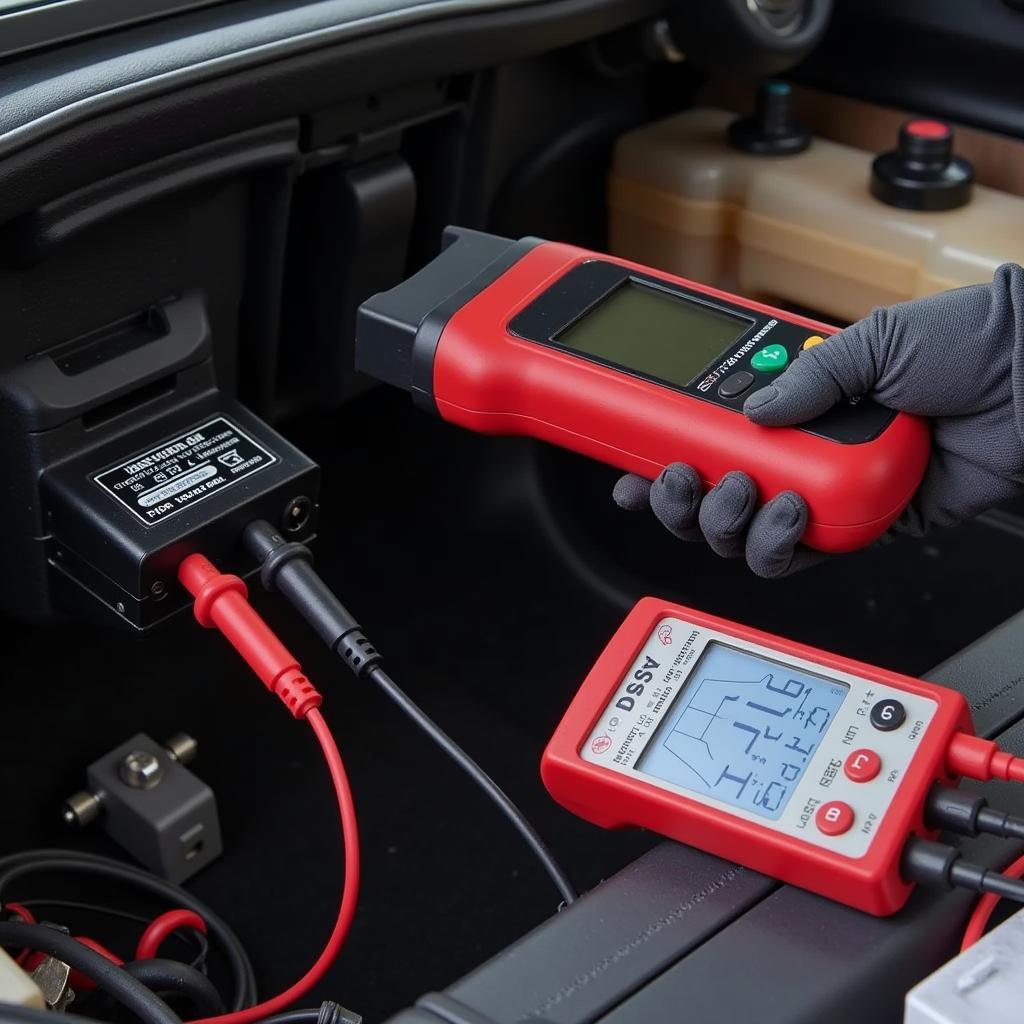Working on your car can be a rewarding experience, saving you money and giving you a sense of accomplishment. But to do it right, you need the right tools for working on a car. Whether you’re a seasoned mechanic or a weekend warrior, having the right tools can make all the difference. From basic hand tools to specialized diagnostic equipment, this article will cover the essential tools you need to tackle common car repairs and maintenance tasks.
Basic Hand Tools: The Foundation of Your Car Toolkit
Every car owner should have a basic set of hand tools. These are the workhorses of your garage and will be used for a wide variety of tasks. Investing in quality tools will save you frustration and money in the long run.
- Wrenches: A good set of combination wrenches (both open-end and box-end) in both metric and standard sizes is essential. You’ll use these for everything from tightening bolts to removing nuts.
- Sockets and Ratchets: Sockets are indispensable for removing and installing fasteners in tight spaces. Invest in a set with both 1/4″ and 3/8″ drives, along with a variety of extensions and adapters.
- Screwdrivers: A set of Phillips and flathead screwdrivers in various sizes is a must-have. Look for screwdrivers with magnetic tips to prevent dropped screws.
- Pliers: Needle-nose pliers, slip-joint pliers, and locking pliers are essential for gripping, cutting, and bending wires and other small parts.
- Hammer: A ball-peen hammer is useful for tapping parts into place or removing stubborn components.
Diagnostic Tools: Finding the Root of the Problem
Modern cars are increasingly complex, relying on sophisticated electronic systems. Diagnostic tools can help you pinpoint the source of problems and save you from costly guesswork.
- OBD-II Scanner: An OBD-II scanner is an essential tool for reading and clearing diagnostic trouble codes (DTCs). It can provide valuable insights into the health of your car’s engine and other systems.
- Multimeter: A multimeter is used to measure voltage, current, and resistance in electrical circuits. This is essential for troubleshooting electrical problems.
Specialized Tools for Specific Tasks
While the basic hand tools and diagnostic equipment will cover most common repairs, certain tasks require specialized tools.
- Jack and Jack Stands: Safety first! Never work under a car supported only by a jack. Jack stands provide a secure and stable platform for working under your vehicle. Consider essential tools for working on cars.
- Torque Wrench: A torque wrench is used to tighten fasteners to a specific torque specification. This is crucial for ensuring proper assembly and preventing damage to components.
- Brake Bleeder Kit: Bleeding your brakes is an essential maintenance task that requires a brake bleeder kit. This kit allows you to remove air from the brake lines, ensuring optimal braking performance.
What Tools Do I Need for Working on an Older Car?
Older cars often present unique challenges and may require specialized tools. For instance, carburetor adjustments might necessitate specific screwdrivers and gauges. You can find more information about working on older vehicles here: useful tools for working on an old car.
How Can DiagFixPro Help?
DiagFixPro offers valuable resources and information on car diagnostic tools and techniques. Check out our article on working on RC cars: tools for working on rc cars. You might also be interested in: woodworking tools to car. For information about using magnetic tools around car AC modules, see: can you use magnetic tools working on car ac module.
“Investing in quality tools for working on a car is an investment in your safety and the longevity of your vehicle,” says John Smith, ASE Certified Master Technician.
“Having the right tools for the job not only makes repairs easier but also helps prevent further damage,” adds Jane Doe, Automotive Engineer.
In conclusion, having the right tools for working on a car is essential for any car owner. From basic hand tools to specialized diagnostic equipment, investing in quality tools will save you time, money, and frustration. Whether you’re a beginner or an experienced mechanic, having the right tools empowers you to tackle common car repairs and maintenance tasks with confidence.
FAQ
- What is the most important tool for working on a car?
- Do I need metric or standard tools for my car?
- What is an OBD-II scanner used for?
- How do I know which size wrench to use?
- What are the safety precautions for working under a car?
- Where can I learn more about car repair?
- What are some common car repair tasks I can do myself?
If you need assistance, contact us via WhatsApp: +1(641)206-8880, Email: [email protected] or visit us at 910 Cedar Lane, Chicago, IL 60605, USA. We have a 24/7 customer support team.

